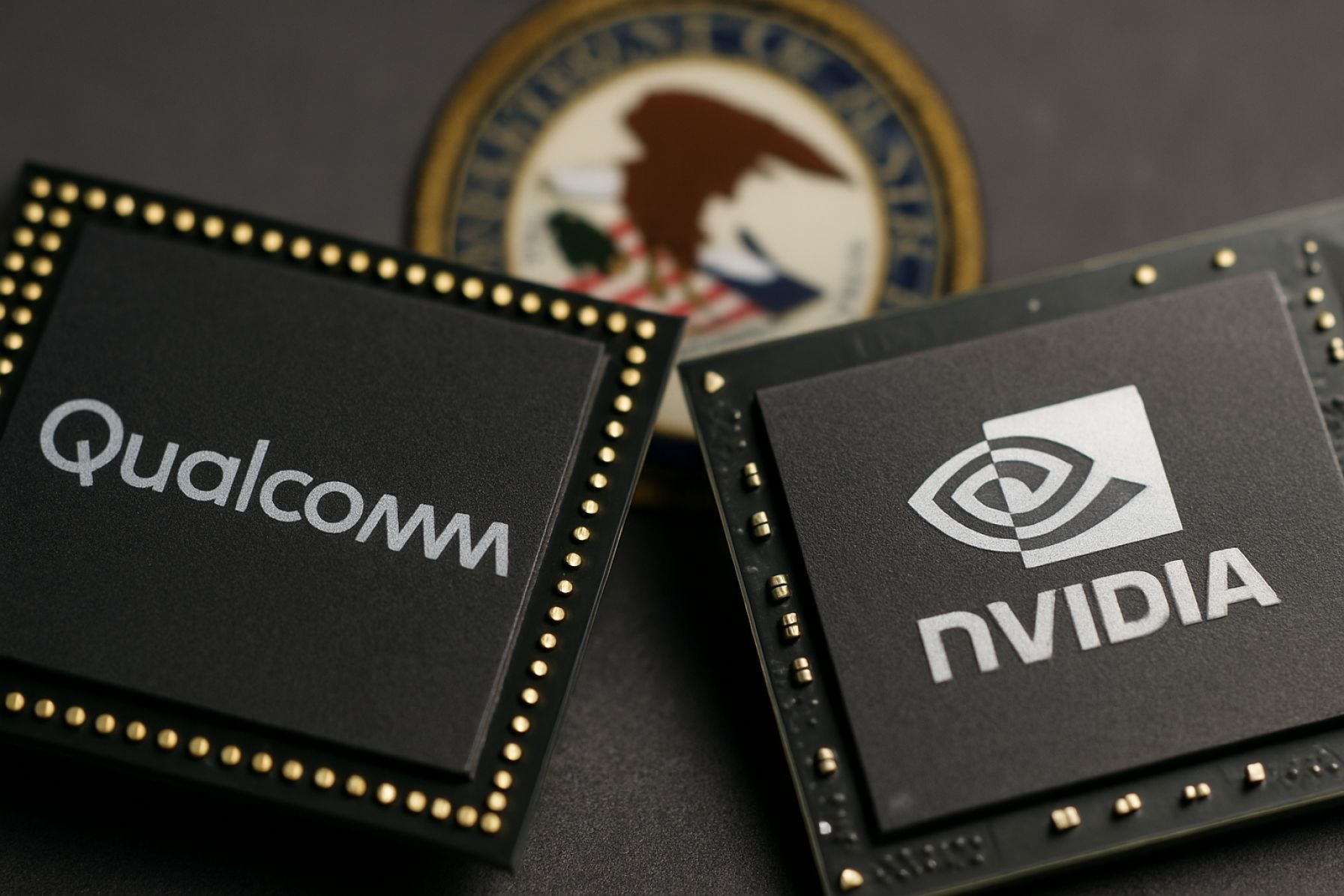- Qualcomm and Nvidia face allegations of patent infringement over imported integrated circuits, sparking a significant USITC investigation.
- The probe’s findings could disrupt global supply chains, potentially restricting imports critical to sectors like smartphones and automotive electronics.
- The USITC’s rigorous examination highlights the high stakes of intellectual property in tech innovation and market competition.
- The outcome could impact the future trajectory of electronics manufacturing and the enforcement of patent protection worldwide.
Under the fluorescent lights of America’s cutting-edge laboratories, a silent legal battle is brewing—one that could reshape the landscape of modern electronics. Recent allegations contend that global giants Qualcomm Inc. and Nvidia Corp. may have overstepped technological boundaries, importing integrated circuits and devices that allegedly tread on the sacred grounds of patent protection.
The U.S. International Trade Commission (USITC), renowned for its judicious scrutiny and expertise in intellectual property, has opened an official inquiry. As investigators pore over blueprints and chipsets, the entire tech world is holding its breath, aware that the outcome could ripple through innovation pipelines and global supply chains alike.
- Cutting-Edge Disputes: At the heart of the probe lie integrated circuits—device brains powering everything from next-gen smartphones to self-driving cars. The precise patents in question remain under wraps, but experts point to crucial design and efficiency features that, if infringed, could affect a new generation of products.
- Industry Impacts: Should the investigation tilt against these powerhouse corporations, measures could be imposed to restrict the import of certain devices. Such a move would send shockwaves through companies reliant on advanced chips, from consumer electronics to the automotive sector.
- Scientific Rigor: The USITC is lauded for its meticulous process. Teams of seasoned engineers, legal scholars, and technologists dissect every detail to determine the legitimacy of infringement claims—a testament to the United States’ commitment to fair competition and technological stewardship.
Market analysts and intellectual property specialists warn that the stakes climb with each passing day. Silicon Valley’s leading lights are no strangers to patent disputes, and legal wrangling has become almost as complex as the microchips at the heart of contention. For Qualcomm and Nvidia—synonymous with the relentless pursuit of innovation—this investigation is more than a legal challenge; it is a crucible that could define the next era of electronics.
As the world waits for the commission’s findings, tech enthusiasts and industry leaders alike recognize that this probe is about protecting invention itself. Whether it ends in a resounding defense of existing patents or a dramatic shift in the technology landscape, the saga underscores one truth: in the relentless quest for progress, the guardians of innovation remain ever vigilant.
Shocking Truths: What They’re Not Telling You About the Tech Patent Battle!
-
Pros:
-
Intellectual Property Protection:
The inquiry by the U.S. International Trade Commission defends innovation and helps ensure that companies like Qualcomm Inc. and Nvidia Corp. respect patent rights, incentivizing further research and development.
-
Unbiased Investigation:
USITC’s reputation for scientific rigor provides some assurance that decisions will be based on evidence, supporting fair competition in the electronics sector.
-
Intellectual Property Protection:
-
Cons:
-
Supply Chain Disruptions:
If a ruling restricts chip imports, downstream industries relying on advanced electronics from companies like Qualcomm Inc. and Nvidia Corp. could face costly delays and shortages.
-
Innovation Slowdown:
Protracted legal disputes can divert resources and attention away from technological breakthroughs, possibly slowing the rollout of next-generation devices.
-
Supply Chain Disruptions:
-
Controversies & Limitations:
-
Opaque Allegations:
Details about the exact patents and technologies at stake remain undisclosed, leaving industry observers and the public in the dark about the broader implications.
-
Global Ripple Effect:
Given the worldwide reach of Qualcomm Inc. and Nvidia Corp., legal outcomes in one jurisdiction could influence approaches to patent enforcement across the globe.
-
Opaque Allegations:
What’s Next for Tech? Future Trends and Legal Shocks You Can’t Afford to Miss!
-
Stricter Patent Policies and Enforcement
As a result of the ongoing high-profile investigation by the
U.S. International Trade Commission, expect a future where patent protection becomes even more rigorous. Innovative companies like
Qualcomm Inc. and
Nvidia Corp. may face tighter regulatory scrutiny not just in the U.S., but globally, leading to slowed product launches and a greater emphasis on original research and development. -
Global Supply Chain Realignment
If import restrictions or penalties result from the findings, experts forecast major shifts in the global supply chain for electronics. Companies across various industries—especially automotive and consumer devices—will need to diversify suppliers and invest in alternative chip technologies to avoid disruption.
-
Rise of IP Litigation and Defense Strategies
Legal battles over patents are predicted to increase in frequency and intensity. Technology companies are expected to allocate more resources to intellectual property defense, spurring demand for specialized legal teams and innovative solutions to track and prove patent originality.
-
Acceleration of Domestic Chip Production
The current saga spotlights vulnerabilities in relying on international chip imports. Look for significant investments in U.S.-based semiconductor manufacturing and renewed government incentives to boost technological self-sufficiency and safeguard national interests.
-
Increased Collaboration and Licensing Agreements
To avoid long, costly disputes and ensure ongoing innovation, leading companies might pursue more cross-licensing deals and strategic collaborations. This could speed up the rollout of next-generation electronics while protecting the innovation pipeline from legal bottlenecks.
In the coming years, the dynamic between patent protection, regulatory enforcement, and technological advancement will define which companies lead—and which struggle—in the global tech arena. Stay tuned to the latest from the
U.S. International Trade Commission,
Qualcomm Inc., and
Nvidia Corp. as the battle to own the future of technology continues to unfold!









